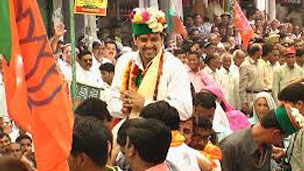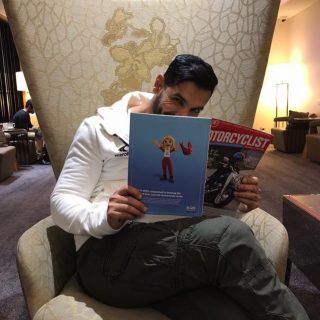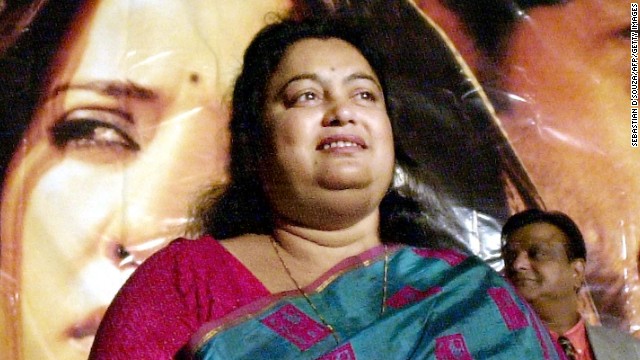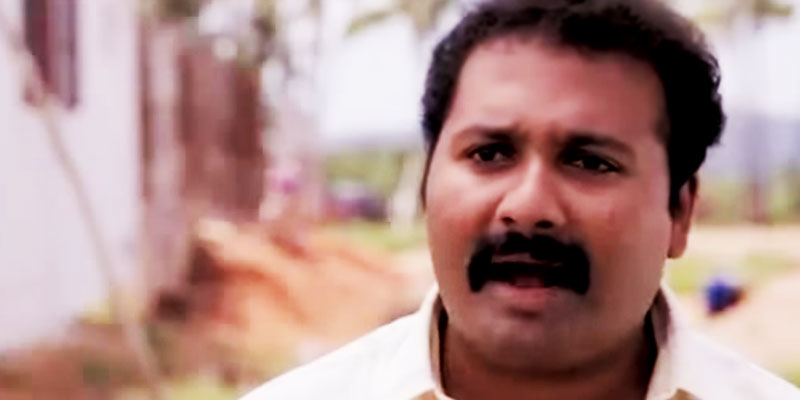BJP’s emerging leader Anurag Thakur accused the Congress-led government of playing communal politics, and treating the minorities only as a vote bank.
Youth will play a crucial role in the 2014 Lok Sabha polls and the social media is the strongest tool to grab their eyeballs, BJP’s upcoming leader Anurag Thakur says.
Thakur, who heads the Bharatiya Janata Party (BJP) youth wing Bharatiya Janata Yuva Morch (BJYM), also said that the social media has played a crucial role in creating an environment against the UPA (United Progressive Alliance) government.
“In any society, youth play a very important role and today’s youth are more aware than a few years back,” Thakur, the son of former Himachal Pradesh chief minister Prem Kumar Dhumal and Lok Sabha MP from Hamirpur, told IANS in an interview.
“Youngsters find an open platform on the social media to express themselves,” Thakur said, adding: “Youth today are expressing their frustration against the government on the social media. It has become a crucial platform against the incumbent government.”
The BJYM, which has more than 100,000 members across the country, has started a special drive to attract new members through social media and direct campaigning. Its Facebook page has over 235,000 followers.
“Issues like unemployment, slumped economy, corruption and lopsided foreign policy have left youth agitated. We have today youngsters who have left plush jobs and joined the BJYM, saying they want to do their bit for the nation,” said Thakur, who is president of the Himachal Pradesh Cricket Association (HPCA).
He also said that the government tried to curb the social media’s independence but could not succeed.
“They tried to curb freedom on social media but failed to do so. The government is scared of the voice of the young; who are impatient and want change soon,” he said.
The saffron party is aware that the restless and aspiring youth could usher in change and are thus focussing on them in big way. Even its prime ministerial candidate Narendra Modi has been mentioning youth in his speeches, promising development and calling upon them to become registered voters and vote for change.
More than half of India’s population is under the age of 25, with 65 percent of the population under 35. Several surveys have shown that as more and more young Indians go online, social media will strongly influence India’s 2014 general elections and may swing three to four percent votes.
Talking about Modi, Thakur said he was the party’s magnet in attracting the young.
“The response to Narendra Modi is enormous, I have not seen such huge crowds come out in many years since the electronic media came in. Young India identifies with him,” he said.
“They feel what he has done in Gujarat he can do in the rest of the country,” he added.
Thakur termed Congress vice president Rahul Gandhi a late comer.
“The common man can never associate with the prince. He is always late in his responses. During the Uttarakhand floods (in June), while Modi went there immediately, Rahul Gandhi went after 10 days and just did a ‘darshan’,” he said.
“Whether it was the Dec 16 (2012) gang-rape, or the anti-corruption movement, his responses have always been delayed. Even on the ordinance shielding convicted lawmakers, Rahul Gandhi’s reaction was quite delayed,” he said.
The government had junked the ordinance that nullified a Supreme Court order on disqualifying parliamentarians and legislators jailed for more than three years after Gandhi termed it “complete nonsense”.
Thakur stressed on focussing on rural youth and bringing them on a par with urban youth.
“The rural youth have a voice and we need to hear it. They are being fooled in the name of schemes like MGNREGA (Mahatma Gandhi National Rural Employment Guarantee Act),” he said.
Accusing the Congress-led government of playing communal politics, he said the party treated the minorities only as a vote bank.
“The recent letter from the home minister (Sushilkumar Shinde) proved they treat minorities just as a vote bank. I would like to ask him why don’t you give out the figures how many states have harassed minorities? Give the data,” he added.
Shinde’s letter, which he has stoutly defended, had cautioned the chief ministers against arresting innocent Muslims in the name of curbing terror.





